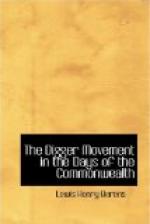[103:1] Others, in far more influential positions than Winstanley and his comrades, gave forcible expression to much the same views. In the debates of the Army Council on the Agreement of the People, on November 1647, Edward Sexby, the Agitator or Representative of the private soldiers, an able, daring, and energetic man, replying to Ireton, on the question of the right to vote, said: “We have engaged in this kingdom and ventured our lives, and it was all for this: to recover our birthrights and privileges as Englishmen; and by the arguments urged, there are none. There are many thousands of us soldiers that have ventured our lives, we have had little propriety in the kingdom as to our estates, yet we have had a birthright. But it seems now that except a man hath a fixed estate in this kingdom, he hath no right in this kingdom. I wonder we were so deceived. If we had not a right to the kingdom, we were mere mercenary soldiers. There are men in my position, it may be little estate they have at present, and yet they have as much a birthright as those two who are their law-givers, or as any in this place.” During the same debate Colonel Rainborrow said: “I think that the poorest he that is in England hath a life to live as the greatest he.” And, also in reply to Ireton, he subsequently declared: “Sir, I see that it is impossible to have liberty but all property must be taken away.... If you will say it, it must be so. But I would fain know what the soldier hath fought for all this while? He hath fought to enslave himself, to give power to men of riches, to men of estate, and to make himself a perpetual slave.”—See Clarke Papers, vol. i. pp. 322-323, 325.
[105:1] King’s Pamphlets. British Museum, Press Mark, E. 564. Also at the Guildhall Library. The Ralph Verney mentioned is the hero of The Verney Memoirs: there is, however, no mention of this incident therein.
[106:1] This argument would scarcely have appealed to Ireton, who during the debate of the Army Council frankly declared that in his opinion—“It was not the business of Jesus Christ, when he came into the world, to create Kingdoms of the World, and Magistracies and Monarchies, or to give the rule of them, positive or negative.”—See Clarke Papers, vol. ii. p. 101.
[108:1] Colonel Rainborrow, who with Sexby and Wildman represented on the Army Council the private soldiers of the Model Army, during the debate on the right of voting, gave expression to the view that some fundamental changes in the laws of the Land were both necessary and justifiable, in the following words: “I hear it said, ’It’s a huge alteration it’s a bringing in of new laws.’ ... If writings be true, there hath been many scuttlings between the honest men of England and those that have tyrannised over them. And if what I have read be true, there is none of those just and equitable laws that the people of England are born to, but were once intrenchments [but were once innovations]. But if they [the existing laws] were those which the people have been always under, if the people find that they are not suitable to freeman, I know no reason that should deter me, either in what I must answer before God or the world, from endeavouring by all means to gain anything that might be of more advantage to them than the government under which they live.”—Clarke Papers, vol. i. p. 247.




